
SPRINGFIELD, Ill. (AP) — Illinois public health officials said Wednesday that they will divert unused COVID-19 vaccine doses intended for long-term care facility residents to the supply for other prioritized recipients.

Gov. J.B. Pritzker’s administration said it will take 97,000 doses from Walgreens and CVS pharmacies intended for the federal Pharmacy Partnership Program.
Pritzker has said the program is moving too slowly while demand for the vaccine among other eligible populations far outstrips supply.
However, he said the program was set up to ensure there would be more than enough doses on hand and the diversion would still leave 110,000 doses for residents of nursing homes and similar facilities. The program is averaging 36,000 shots a week and the state will be ready to replenish the pharmacy program if that rate increases.
“We want to make sure every dose allocated to Illinois can be used as quickly and equitably as possible,” the state public health director, Dr. Ngozi Ezike, said in a statement. “Long-term care residents and staff remain a top priority and we will ensure there will be as many doses readily available to those facilities” as needed.
The state reported 3,314 confirmed and probable new cases of COVID-19, the illness caused by the coronavirus. There were 69 additional deaths, bringing Illinois’ total fatalities to 19,375 among 1,134,231 infections.
Long-term care residents are in the first wave of prioritized populations, called Phase 1a, along with front-line health care workers. Of 496,100 doses delivered to the pharmacy program, 35% have been administered to long-term care residents.
The state is allowing Phase 1b qualifiers to sign up, including people over 65 and other essential workers. Roughly 3.2 million people qualify.
The list grew on Wednesday by 177. Pritzker announced that after a request from the General Assembly, he would allow 118 state representatives and 59 state senators to get shots as part of Phase 1b to encourage lawmakers to “engage in a robust and productive schedule in coming weeks and months.”
That provision currently does not include legislative staff, however, and after canceling most of the body’s session last spring because of COVID-19 transmission fears, leaders of both Houses said this week they would begin work this year through video conference.
“The issues and challenges facing the General Assembly are enormous, so this is a welcomed step in the interest of government functionality and safety,” the new House speaker, Democrat Emanuel “Chris” Welch of Hillside, said in a statement. He said the shots would not be required.
There was no indication that lawmakers would be vaccinated ahead of the other more than 3 million people in the Phase 1b line. Additionally, two shots of vaccine are needed, three to four weeks apart, depending on the brand. So whether they could all be vaccinated in time to allow for a return to normal, in-person legislating before the scheduled May 31 adjournment of the session is in question.
